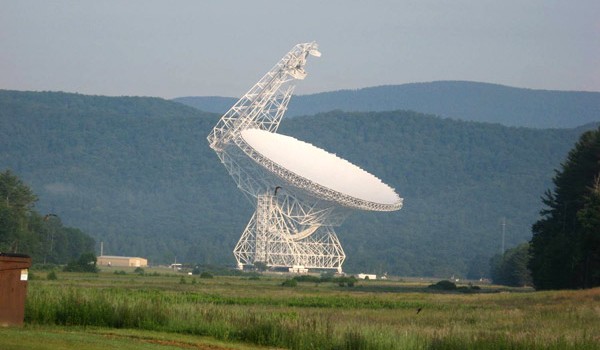GREEN BANK, W.Va. — The Robert C. Byrd Green Bank Telescope in Pocahontas County will be one of two large telescopes used in a 10-year, $100 million search for extraterrestrial intelligence, called Breakthrough Listen, from Stephen Hawking, a famed physicist, and Yuri Milner, a Russian entrepreneur.
 Breakthrough Listen boils down to one question — Are we alone in the Universe?
Breakthrough Listen boils down to one question — Are we alone in the Universe?
“NASA is funding research to look for habitable planets in nearby star systems, but no one in the federal government is funding studies for looking for radio signals from other civilizations,” said Earl Scime, chair of West Virginia University’s Department of Physics and Astronomy.
“The fact that private people have stepped up to do this is very exciting.”
“We believe that life arose spontaneously on Earth so, in an infinite universe, there must be other occurrences of life,” Hawking said during Monday’s announcement of Breakthrough Listen, billed as the most comprehensive and intensive search ever for signs of intelligent life elsewhere.
In the coming decade, the nearest 1 million stars in the Milky Way Galaxy along with 100 other galaxies will be scanned for tell-tale radio signatures of advanced civilization, according to information from the National Radio Astronomy Observatory in Green Bank.
The Green Bank Telescope is the world’s largest, fully steerable radio telescope and is located in the National Radio Quiet Zone, protecting it from unwanted radio interference.
Such interference, detected elsewhere, could be indicators of life, according to Scime. “Signals that are periodic or controlled that might be generated by radio sources, radar sources, from other civilizations,” he said of examples.
Funding from the Breakthrough Prize Foundation, about $2 million per year for five years, will pay for research work at the Green Bank Telescope. Starting next year, the galaxy searches are scheduled to take up about 20 percent of the research time there.
The other telescope that will be used is the CSIRO Parkes Radio Telescope in Australia.
Scime noted Frank Drake, a radio astronomer, pioneered the search for extraterrestrial intelligence when he launched Project Ozma at the Green Bank Telescope in the early 1960s.
“The Drake Equation that Drake developed back in the 1960s basically argued that there was such a high probability of life and there were so many different places it could be, that eventually you would find something,” Scime said when asked what scientists could potentially locate while searching the Universe.
He was hesitant to make predictions, though, about possible discoveries.
“Not to go out on a limb, I think eventually we’ll probably see some sign of life from another civilization,” Scime said. “Whether it happens in my lifetime, I’m just not sure.”

